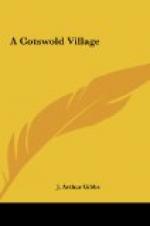The hounds turn up punctual to the appointed time. How beautiful and majestic they look as they suddenly come into sight amid beech and ash and walnut, whilst the bright pageant advances leisurely and in order over the ancient ivy-covered bridge which spans the silent river, where the morning mist still hangs, and the grass shines white with silvery dew. In good condition they look, too—a credit to their huntsman, who evidently has not neglected giving them plenty of exercise on the roads during the summer. You greet the genial master; then in answer to his enquiry as to where you would like him to draw, you point to the hanging wood on the brow of the hill, and tell him that as you heard them barking there this very morning it is a certain find. No sooner are the words out of your mouth than a holloa breaks the silence of the early morn: the gardener has “viewed” a cub within a hundred yards of the house. Desperately bold are the cubs at this time of year, before they have been hunted. Their first experience of being “stopped out” for the night does not seem to have frightened them at all. They have been kicking up a rare shindy most of the night in the covert close to the house.
“Alas I regardless
of their doom,
The little victims
play.”
By to-night they will have become sadder and wiser beings. Several people will be glad of this, the keeper included: for the fowls have suffered lately; there have also been one or two well-planned and carefully thought out sallies on the young pheasants—without much damage, however. Not long ago a bold young cub spent some time in breaking open the lid of one of the coops, in which were some late pheasants. He actually forced the wire netting from the roof of the coop, although it was firmly nailed to the woodwork. But he could not quite get his head in, for when the keeper arrived on the scene at five o’clock a.m., there he was, clawing and scratching at the birds. His efforts met with no success, however, for not a single bird was badly injured, though some damage might have been done if Master Reynard had not been interrupted at this critical moment. Young cubs are like puppies, very mischievous. There are plenty of rabbits about, and they are the food foxes like best; poultry and pheasants are pursued and killed out of pure love of mischief.
We must return to the hounds. Our huntsman wisely determines not to go to the holloa, for he prefers to let the young entry draw for their game. Besides which, if this cub has gone away, he is one of the right sort, and does not require schooling. For as we all know, one of the objects of cub-hunting is to teach the young foxes that if they don’t leave the covert when the hounds are thrown in, they will get a rare dusting. So, the hounds having been taken to the “up-wind” end of the wood, the huntsman begins drawing steadily “down wind.” Let them have every chance now; it will be quite early enough to begin drawing up wind when the leaf is off and Reynard has got a bit shy. Blood is an excellent thing for young hounds, nay, for all hounds, early in the season; but we don’t want to chop any cubs before they know where they are or what it all means.




